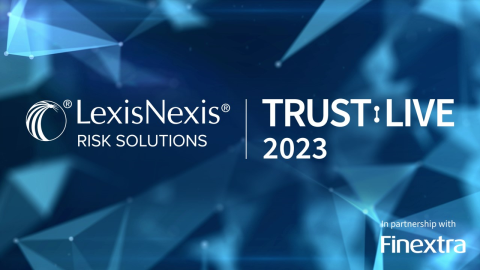This week, LexisNexis® Risk Solutions and Finextra Research hosted Trust:Live 2023, a premier in-person gathering for fraud and identity decision-makers. The event addressed the latest challenges in building trust to protect customers, defend brands, and adapt to changing business models.
The agenda focused on the fundamental elements of trust evolution: Identity, Intelligence, and Innovation. It showcased real-life projects from banks, payments providers, fintech firms, governments, and regulators.
Steve Elliot, managing director of UK&I at LexisNexis Risk Solutions, kicked off the event by emphasizing the need for innovative solutions to contemporary societal problems, including the high cost of compliance. He highlighted that UK financial services companies currently face a compliance cost exceeding £34 billion annually, money that could be better used to enhance products and services for consumers.
Elliot also drew attention to the issue of financial inclusion, estimating about seven million individuals are financially excluded because they lack sufficient data for effective credit scoring. He stated that without access to affordable credit, these individuals often have to turn to more expensive options.
In her keynote address, “Identity, Intelligence, and Innovation – the evolution of trust,” Julie Conroy from Aite-Novarica Group discussed how advancements in data technology and behavioral science are enhancing trust. She underscored that identity is crucial for trusted commerce, and despite improved tools for fighting fraud, the surge in digital attacks has made cybersecurity increasingly complex.
During a panel discussion on the future of identity trust, moderated by Finextra’s Gary Wright, industry leaders including Diana Zavoianu from Paysafe Group and Andrew Mayo from Sky discussed the balancing act between consumer demand and security. They stressed the importance of adapting to local market conditions and the need for more effective customer education on password hygiene.
The next panel examined the guardianship of identity in the digital age, featuring experts like Nick Mothershaw from Open Identity Exchange and Seema Khinda Johnson from Nuggets. It was noted that the COVID-19 pandemic significantly expedited advancements in digital identity, creating a framework for remote transactions, including using digital credentials effectively.
In another session, discussions revolved around solving digital identity exclusion for vulnerable populations. Panelists explored the challenges presented by online identity verification and the need for frameworks that distinguish genuine identities from synthetic ones.
Throughout various sessions, experts shared insights on the complexities and threats to online identity trust, including the urgent need for better data-sharing practices to combat organized crime and better protect consumers from identity theft.
Louise French from the Future Laboratory explored the concept of the “Authentaverse,” a digital trust ecosystem aimed at facilitating seamless authentication without the usual frictions like passwords.
In the concluding discussions, participants acknowledged the significant potential for AI in protecting trusted identities. However, there were also cautionary notes about the biases inherent in AI systems and the importance of developing models that promote financial inclusion without compromising security.
Overall, the event highlighted the urgent need for collaboration among industry players to enhance trust frameworks and navigate the increasingly complex digital landscape. Key takeaways included the importance of adaptability, the need for robust partnerships in data sharing, and the recognition of the evolving nature of identity in a world driven by technology.
